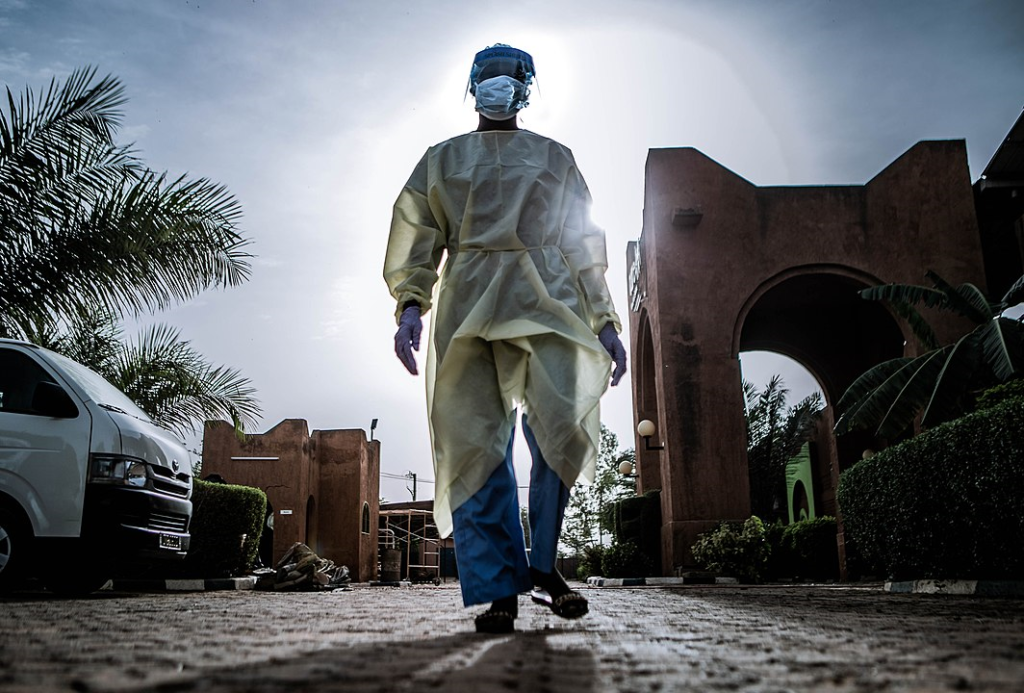
The COVID-19 pandemic will exacerbate the very weaknesses that have marked the democratic erosion of the last decade in most of the 137 developing and transformation countries examined in the latest Bertelsmann Transformation Index (BTI 2020), (released today), notably diminished rule of law, limited political rights, fiscal instability and rising social inequality, writes Hauke Hartmann, Senior Expert at the Bertelsmann Stiftung and BTI project director.
Currently, the coronavirus pandemic is gripping large parts of the world. It is neither foreseeable how fast and far COVID-19 will spread, nor how long the resultant economic and social crisis will last until a vaccine is developed. What is clear, however, is that it will severely strain and probably overburden the often poorly developed health care systems of many of the 137 developing and transition countries examined by the Bertelsmann Foundation’s Transformation Index (BTI), and will have far-reaching economic and social consequences. Some experts are already predicting that many countries will be set back many years in their development and that hundreds of millions of people are at risk of falling back into extreme poverty (Steiner 2020). This is an unprecedented stress test for the stability of political institutions and the governance capacity of the states affected by the pandemic.

BTI
The current handling of the crisis and its future repercussions suggest that the pandemic will exacerbate the very weaknesses that have marked the negative balance of the past decade identified by the BTI 2020 (Bertelsmann Stiftung 2020). In many countries, it will
- contribute to increase the concentration of power in the executive branch and accelerate an erosion of the rule of law, in conjunction with grave restrictions on political rights such as freedoms of assembly and expression,
- further increase the severe fiscal and monetary instabilities in many countries due to massive investment needs to contain the crisis and revive the economy,
- and have a particularly severe impact on the weakest members of society, thereby further increasing poverty and inequality.
It might also intensify the already existing tendencies towards polarization, exclusion and nationalistic isolationism, even though more positive scenarios of increased domestic solidarity and international cooperation are not to be written off prematurely. In this context, it is precisely the wealthy European countries that should send a strong signal of international solidarity and assistance.
Concentration of power and erosion of democracy
In times of crisis, there is a growing willingness to accept restrictions on fundamental rights and an extension of executive powers in order to avert an imminent danger. This is the logic of emergency provisions incorporated in the constitutions of many states. Almost all governments have now responded to the rapid spread of the corona pandemic with rigid contingency plans designed to coordinate infection control measures, expand medical treatment and material procurement, impose curfews and contact bans, stimulate the economy and avoid social hardship.
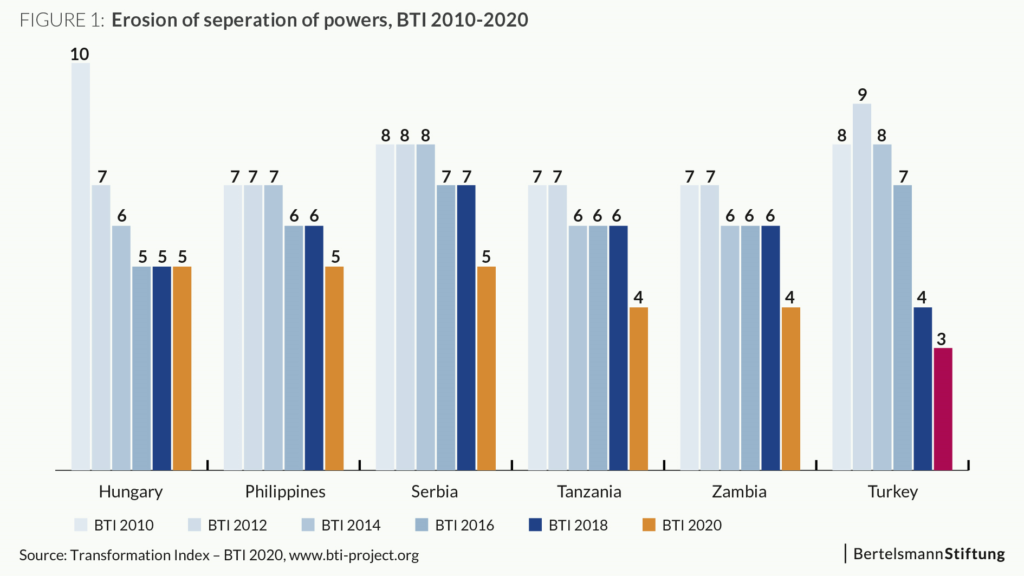
Even if federally constituted democracies such as Germany and Switzerland generally have certainly demonstrated their partly decentralized political ability to act (Bertelsmann Stiftung 2019), in many countries, a strong centralized leadership is not only accepted or preferred for reasons of (supposedly) more effective policy coordination. It is also desired by many citizens, because in uncertain times the need for information, encouragement and orientation by a determined and guiding executive grows.
However, this crisis-driven approval of a strong executive branch is currently prevalent at the end of a decade, during the course of which the separation of powers has already been undermined, in some cases massively, in 60 of the 128 states examined by the BTI since 2010 (Donner 2020). In numerous countries, increasingly authoritarian heads of state now have the opportunity to further expand their already overstretched powers.
The Hungarian example illustrates this problem: on March 30, Parliament adopted a self-disempowering emergency law by a two-thirds majority of the ruling Fidesz party that allows Prime Minister Viktor Orbán to govern by decree to deal with the crisis, extend the state of emergency indefinitely and suspend or deviate from existing legislation. This is combined with draconian sanctions for spreading misleading information and obstructing the fight against the pandemic and provides the government with extensive opportunities to further restrict freedom of expression and silence public criticism. The indefinite nature of a state of emergency and the complete disempowerment of parliament constitutes the not only factual but also formal undermining of the separation of powers. The government thus has, in the words of the Hungarian philosopher Gáspár Miklós Tamás, used “the epidemic as a pretext to introduce an open, structural dictatorship ” (Deutsche Welle 2020).
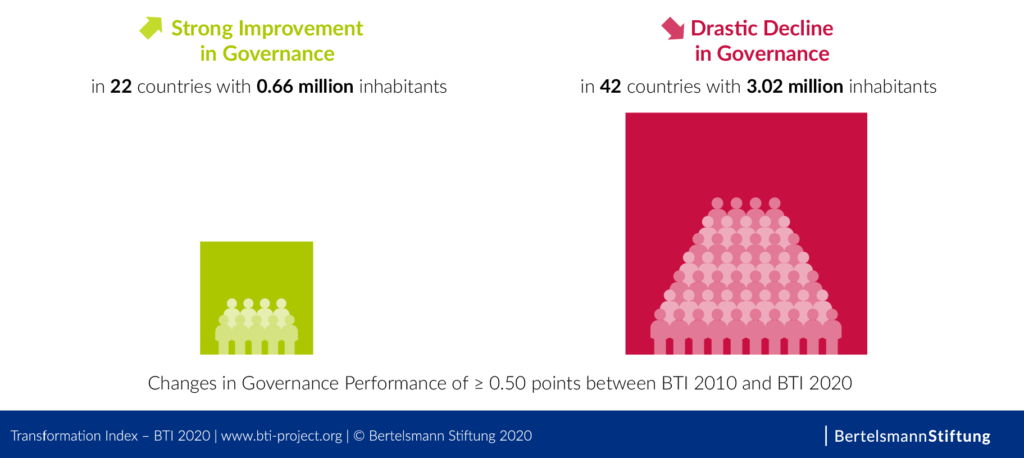 Even though the Hungarian undermining of the separation of powers represents the most serious case of democracy erosion to date, several governments are already moving in a similar direction, especially regarding restrictions on freedoms of expression and assembly. In addition to Hungary, the BTI 2020 particularly identifies Serbia, the Philippines, Tanzania and Zambia as candidates for slipping into authoritarianism. In these countries, the rule of law has already been undermined to a worrying extent in recent years, and if the concentration of executive power continues in the wake of the Corona crisis, their separation of powers is also in danger of falling below minimum democratic standards, as has already happened in Turkey.
Even though the Hungarian undermining of the separation of powers represents the most serious case of democracy erosion to date, several governments are already moving in a similar direction, especially regarding restrictions on freedoms of expression and assembly. In addition to Hungary, the BTI 2020 particularly identifies Serbia, the Philippines, Tanzania and Zambia as candidates for slipping into authoritarianism. In these countries, the rule of law has already been undermined to a worrying extent in recent years, and if the concentration of executive power continues in the wake of the Corona crisis, their separation of powers is also in danger of falling below minimum democratic standards, as has already happened in Turkey.
The Turkish example, in turn, clearly shows that a concentration of power in the executive branch does not necessarily contribute to improving governance performance, but rather limits the ability of governments to learn from their own experience and external advice (Schwarz 2020). Long before the corona crisis, a system increasingly tailored to one single leader gradually robbed itself of critical discourse, alternative ideas and thus ultimately innovative potential and flexibility.
Such a limited policy learning ability became particularly noticeable in the sluggish recovery from the Turkish economic crisis in 2018, the inefficient use of available resources and the uncompromising stance taken in international relations .
Such an experience is shared by many countries in which the quality of democracy has deteriorated considerably. Almost a quarter of all governments demonstrated less willingness and ability to engage in policy learning in the last two years, especially in defective democracies and new autocracies like Turkey. In times of a global epidemic, in which rapid adaptability, transparent evaluation and communication as well as informed cooperation between many social actors is required, this reduction in the quality of governance will have an even more damaging effect.
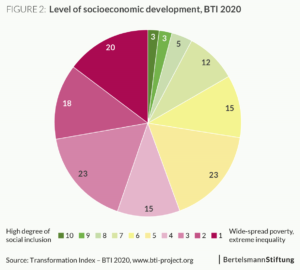
The Chinese reaction to the unfolding corona crisis, in turn, demonstrates the deficiencies of limited accountability and transparency especially in autocracies. When the first indications of a new, highly contagious infection risk appeared in mid-November 2019 in the Chinese province of Hubei, this information was suppressed, concerned doctors intimidated and laboratories closed. Precious time to contain COVID-19 was wasted, until the Chinese leadership had to correct itself after two months and then reacted with draconian measures of cordoning off and curfew in the affected province.
Since then, the country has – should the published data be correct – apparently achieved significant successes in containing this infectious disease and has also demonstrated an impressive willingness to cooperate and help at the international level, but the triumphalism of the Chinese leadership seems propagandistic and out of place in view of its early failures. When Chinese Foreign Minister Wang Yi explains in an interview with the Reuters news agency that “only in China and only under the leadership of President Xi can there be such effective measures to put this sudden and fast spreading epidemic under control” (Reuters 2020), he is ignoring the achievements of Asian democracies like South Korea and Taiwan. Their governments have, under similarly good conditions – including a meritocratically oriented civil service and helpful previous experience with the fight against the infectious disease SARS of 2003 – achieved similarly good containment successes, largely in compliance with rule of law standards and with a functioning and transparent early warning system. In this respect, there is much to suggest that China, after initial and system-related mistakes, has taken many subsequent steps in the right direction, not because of, but despite its authoritarian one-party rule.
However, the record of pandemic control to date is mixed as far as the regime issue is concerned, partly due to the erratic course taken by numerous democratically elected populist governments. At present, it looks more as if the competence and legitimacy of a government are the decisive factors, regardless of the political system (Kleinfeld 2020). This at the very least implies that – contrary to what the protagonists of a heavy hand claim – autocratization in itself does not promise efficiency gains.

BTI
Moreover, the results of the BTI 2020 point to serious legitimacy deficits in autocracies and democracies alike. Since autocratic governments cannot resort to input-oriented legitimacy arguments, they have to justify their rule solely by means of their economic and social performance. However, in the BTI 2020 only four autocracies (three Gulf states plus Singapore) achieve an advanced level of economic development, together with 22 democracies. In addition, there are eight autocracies, including China, Russia and Turkey, which have only achieved a limited economic transformation, but have reached a total score of 6.00 points or more and are thus still in the upper half of the BTI’s economic transformation table – together with yet another 22 democracies. If the autocratic performance record of only a good fifth (12 out of 56) of all economically and socially passable or successful states is already sobering, it becomes utterly catastrophic at the lower end of the BTI economic ranking. The 25 states with a particularly weak economic transformation status are exclusively autocracies whose governments, as in Iran or Venezuela, have to cling to ideological justifications, because their output-oriented legitimacy arguments have long been exhausted.
Conversely, however, the cushion of legitimacy has also become thin in democracies over the past ten years. In many democratically governed countries, the BTI 2020 also records political and economic competition that is increasingly distorted by corruption, abuse of power and patronage-based structures, resulting in political disenfranchisement and growing social inequality. The growing frustration of many citizens with these developments is expressed in declining approval ratings for democracy, which have fallen by 0.79 points on a scale of ten on a global average since the BTI 2010. Among the 57 countries classified as democracies by both the BTI 2010 and the BTI 2020, approval ratings fell in 34 states – and rose in only two (Mauritius and Senegal). Although clear majorities in most societies are still in favor of a democratic system, there is a growing dissatisfaction with the way democracy works in their countries and an increasing distrust of institutions and politicians.
Such a level of distrust, both in democracies and autocracies, weakens the social fabric. The lack of legitimacy of many governments will make an effective and trustful all-societal response to the spread of COVID-19 even more difficult.
The looming economic and social disaster
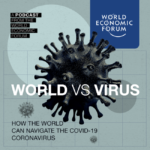 Most of the 137 countries assessed by the BTI 2020 do not have sufficient financial resources available for crisis mitigation, public health investments and economic stimulus packages. Already the BTI 2020 global Economy Report (Hartmann 2020), written before the outbreak of the corona crisis, warned of an impending debt crisis, and since then this scenario has become much more likely. By mid-April, over 100 governments had already applied to the International Monetary Fund for financial assistance (IMF 2020).
Most of the 137 countries assessed by the BTI 2020 do not have sufficient financial resources available for crisis mitigation, public health investments and economic stimulus packages. Already the BTI 2020 global Economy Report (Hartmann 2020), written before the outbreak of the corona crisis, warned of an impending debt crisis, and since then this scenario has become much more likely. By mid-April, over 100 governments had already applied to the International Monetary Fund for financial assistance (IMF 2020).
The past decade has been characterized by a sharp decline in fiscal discipline. Many governments initially benefited from a surge in foreign exchange earnings, which for some time remained at a high level and were fed by rising commodity prices and other sources such as remittances from migrant workers, tourism revenues and industrial goods exports. As a result, their budgets became increasingly expansive. When world market prices for energy, metals and agricultural products fell rapidly from the end of 2014 onwards and as global demand weakened, this resource-driven growth model became fragile. Without productivity gains, product diversification, the strengthening of domestic demand and a substantial integration of the informal sector into the formal sector, it rapidly reached its development limits.
Many national budgets are now threatened with bankruptcy in view of the necessary investments in the health care system and crisis management, as well as with sharply decreasing international demand and massive capital outflow. The fiscal stability indicator in the BTI 2020 shows one of the worst deteriorations in this decade, with an average global decline of 0.45 points on the BTI 10-point scale. The share of countries such as China, South Korea and Taiwan with a robust fiscal stability of 8 to 10 points almost halved from 37 percent in the BTI 2010 to 20 percent in the BTI 2020.
Many countries are more heavily indebted than at any time since the 1980s. According to the World Bank, the share of government revenue spent on interest payments alone is particularly high in Lebanon (45.7 percent) and Sri Lanka (40.0 percent). However, the governments of Brazil and Egypt also spend a whole third of their government revenues on interest payments and have lost significantly (-3 and -2 points respectively) in terms of the fiscal stability assessed in the BTI over this decade. Still a quarter of the budget is spent on interest payments in Ghana (-2), India (-1), Jamaica (-1) and Zambia (-2). The low-income countries are particularly affected, almost half of which are experiencing acute servicing difficulties. This is partly because the share of non-concessional loans at higher interest rates developing countries received has risen from just under a quarter to 46 percent in the last twelve years (GDI 2019).
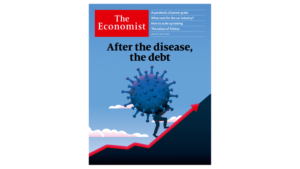 Massive over-indebtedness could result in a wave of state bankruptcies in the wake of the corona pandemic. The economic shockwave has already reached numerous countries before the anticipated high infection rates have even occurred there. In Argentina, the restructuring of government debt, which rose sharply again under President Mauricio Macri, is threatening to fail, South Africa’s government bonds have again been downgraded to junk status by rating agencies, Brazil’s growth forecasts have already been quartered, and after the currency crisis of 2018 Turkey lacks the fiscal policy leeway for more than the presumably inadequate economic stimulus package of 15 billion euros announced March 18.
Massive over-indebtedness could result in a wave of state bankruptcies in the wake of the corona pandemic. The economic shockwave has already reached numerous countries before the anticipated high infection rates have even occurred there. In Argentina, the restructuring of government debt, which rose sharply again under President Mauricio Macri, is threatening to fail, South Africa’s government bonds have again been downgraded to junk status by rating agencies, Brazil’s growth forecasts have already been quartered, and after the currency crisis of 2018 Turkey lacks the fiscal policy leeway for more than the presumably inadequate economic stimulus package of 15 billion euros announced March 18.
Poorer and fiscally unstable energy exporting countries such as Angola, Nigeria and Venezuela, which are suffering not only from their own policy failures but also from the fall in oil prices induced by Saudi Arabia and exacerbated by lower demand. In many developing countries, the domestic currency has proved to be weak against the dollar, making debt servicing for dollar-denominated loans extremely difficult. As a result, the banking system in these countries is on the verge of collapsing.
 The tragedy of this precarious fiscal policy situation is that in many countries there is accordingly a lack of resources to deal with the comprehensive social shock that will result from overburdened health systems, the severe contraction of the economy and the resulting massive socioeconomic deprivations. The “hammer and dance” strategy pursued by highly developed industrialized nations such as Germany, i.e. to let the infection rate (and the resulting immunization of part of the population) rise in a mix of restriction and relaxation, if possible only up to the stress limit of the health care system (Pueyo 2020), to take parallel stabilizing measures for companies at risk of bankruptcy and to prevent social hardship, is not a viable path for most of the developing and transition countries examined by the BTI for several reasons:
The tragedy of this precarious fiscal policy situation is that in many countries there is accordingly a lack of resources to deal with the comprehensive social shock that will result from overburdened health systems, the severe contraction of the economy and the resulting massive socioeconomic deprivations. The “hammer and dance” strategy pursued by highly developed industrialized nations such as Germany, i.e. to let the infection rate (and the resulting immunization of part of the population) rise in a mix of restriction and relaxation, if possible only up to the stress limit of the health care system (Pueyo 2020), to take parallel stabilizing measures for companies at risk of bankruptcy and to prevent social hardship, is not a viable path for most of the developing and transition countries examined by the BTI for several reasons:
- First of all, as outlined, almost all governments in these countries lack the fiscal capacities to take stabilizing and social policy measures on a European scale.
- Secondly, the medical infrastructure in most countries is so poorly developed that their capacities will very quickly be overstretched even with a moderate infection rate. For example, even under normal conditions, South Africa’s comparatively well-developed health care system, compared to other African countries, is already at the limit of its capacity with over seven million HIV-infected people.
- Thirdly, given the lack of hygienic, socio-spatial and management capacities in most countries, the infection rate cannot be kept under control once the epidemic has broken out. The Indian example, where millions of migrant workers carry the virus from the overcrowded cities back to their villages, illustrates that in the face of the daily struggle for survival, the call for “social distancing” will go unheard.
Life at or below the poverty line is part of daily experience for most people in developing countries. In the BTI 2020, 76 of 137 countries have a very low level of socio-economic development, rated at 4 points or less. Thus, in more than half of all countries examined by the BTI, poverty and inequality are widespread and indicate firmly established patterns of exclusion.
 Despite a general decline in extreme poverty rates, social inequality has increased over the past decade, even in the few countries whose governments pursue active welfare policies. In Botswana, for example, the wealth of resources has been and is being used for a long-term development strategy, which has resulted, among other things, in almost halving the official poverty rate to 16 percent within 20 years. Nevertheless, about another third of the population lives only just above this poverty rate and continues to be exposed to high social vulnerability, so that the coefficient of income inequality in the Gini index, currently around 0.53, still points to extreme socio-economic polarization. In Latin America, the region with the greatest social inequality overall, numerous governments have succeeded during the resource boom in fostering the emergence of a “precarious middle class” (Thiery 2020), millions of which have already slipped back into poverty in recent years and which is threatening to dissolve almost completely in the wake of the economic corona shock.
Despite a general decline in extreme poverty rates, social inequality has increased over the past decade, even in the few countries whose governments pursue active welfare policies. In Botswana, for example, the wealth of resources has been and is being used for a long-term development strategy, which has resulted, among other things, in almost halving the official poverty rate to 16 percent within 20 years. Nevertheless, about another third of the population lives only just above this poverty rate and continues to be exposed to high social vulnerability, so that the coefficient of income inequality in the Gini index, currently around 0.53, still points to extreme socio-economic polarization. In Latin America, the region with the greatest social inequality overall, numerous governments have succeeded during the resource boom in fostering the emergence of a “precarious middle class” (Thiery 2020), millions of which have already slipped back into poverty in recent years and which is threatening to dissolve almost completely in the wake of the economic corona shock.
A major problem in this context is the small size of the formal sector in most countries. According to the International Labour Organization, more than 60 percent of the global workforce is employed in the informal sector, and in Sub-Saharan Africa, the figure is as high as 85 percent (ILO 2018). Even though the informal sector represents a safety valve for the unemployed, it is significantly less productive, less well paid, less accessible in terms of welfare policies and hardly protected by labor law at all. The social vulnerability of the population working in the informal sector is therefore particularly high and, as in the case of India with well over 80 percent of informal workers, is threatened by the corona crisis to increase dramatically. In this respect, the pandemic threatens to evolve into a global social crisis of unprecedented magnitude.
Poor governance in times of crisis

BTI
Against the background of the acute threat of major political, economic and social disruption, it is particularly problematic that many governments in developing and transformation countries are inadequately equipped for these major challenges. The current Transformation Index of the Bertelsmann Foundation paints a worrying picture and shows that the quality of governance in many countries has declined significantly over the past decade. These include populous and economically powerful countries such as Egypt, Brazil, India, Indonesia, Mexico, Nigeria and Turkey. Overall, governance performance has deteriorated significantly since the BTI 2010 in 42 of the 128 countries continuously surveyed (with a drop of at least 0.50 points on the BTI 10-point scale), affecting more than three billion people – almost half of the total population of the BTI country sample.
In view of the need for a crisis strategy supported by society as a whole and coordinated internationally, it is particularly alarming that that the consensus-oriented aspects of governance such as conflict management or the willingness to cooperate internationally are declining very sharply.
Existing ethnic, religious or regional cleavages are often instrumentalized and deepened, so that the polarization of societies has increased worldwide over the past decade. Since 2010, the ability or willingness of governments to mediate and defuse conflicts has declined in 49 countries.
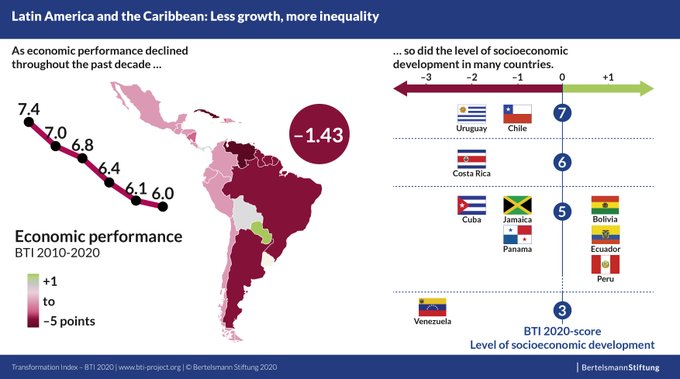 With a minus of 4 points on the BTI 10-point scale, this was particularly true of six countries, including Brazil, India and Turkey. President Jair Bolsonaro’s right-wing populism seeks to reverse Brazil’s emancipatory and socio-political progress in the interests of its clientele of evangelicals, social conservatives and business lobbyists and has deepened the political divisions in his country. The Hindu-nationalism of Prime Minister Narendra Modi undermines the pluralistic and secular foundation of the multi-ethnic state and intensifies the conflicts with the Muslim minority with ethnocentric measures such as the new citizenship law or the abolition of autonomy rights for Kashmir. The authoritarian Islamism of President Recep Tayyip Erdoğan is directed against the followers of the Gülen movement and the Kurdish minority, and with its uncompromising persecution of opposition critics, Turkey is considered an autocracy by the BTI 2020. All three heads of state have in common that through their exclusionary policies they have contributed substantially to reducing a unifying, non-identity-based social capital in their countries and thus made it more difficult for society-at-large to fight the corona crisis.
With a minus of 4 points on the BTI 10-point scale, this was particularly true of six countries, including Brazil, India and Turkey. President Jair Bolsonaro’s right-wing populism seeks to reverse Brazil’s emancipatory and socio-political progress in the interests of its clientele of evangelicals, social conservatives and business lobbyists and has deepened the political divisions in his country. The Hindu-nationalism of Prime Minister Narendra Modi undermines the pluralistic and secular foundation of the multi-ethnic state and intensifies the conflicts with the Muslim minority with ethnocentric measures such as the new citizenship law or the abolition of autonomy rights for Kashmir. The authoritarian Islamism of President Recep Tayyip Erdoğan is directed against the followers of the Gülen movement and the Kurdish minority, and with its uncompromising persecution of opposition critics, Turkey is considered an autocracy by the BTI 2020. All three heads of state have in common that through their exclusionary policies they have contributed substantially to reducing a unifying, non-identity-based social capital in their countries and thus made it more difficult for society-at-large to fight the corona crisis.
At the international level, too, the consensus-building aspects of governance have lost considerable weight, especially in Central America, the Middle East and in East-Central and Southeast Europe. Regional political power struggles and illiberal alliances have significantly impaired cooperation with external supporters and in the bilateral and multilateral framework. It is precisely the regional willingness to cooperate, which generally is rated quite highly, that has declined sharply in the BTI 2020. This points to the problematic perspective that in many places the response to the corona pandemic will be characterized by nationalistic self-interest and isolationism.
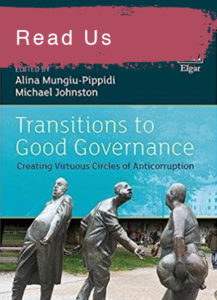 However, it is not yet possible to foresee what effects the global health, economic and social crisis will have on the quality of governance in developing countries. Much more positive scenarios are also conceivable. There are already signs of a disenchantment with authoritarian-populist governments, whose confrontational and divisive policies have had a negative impact on effective crisis management in Brazil, Indonesia and the Philippines, for example:
However, it is not yet possible to foresee what effects the global health, economic and social crisis will have on the quality of governance in developing countries. Much more positive scenarios are also conceivable. There are already signs of a disenchantment with authoritarian-populist governments, whose confrontational and divisive policies have had a negative impact on effective crisis management in Brazil, Indonesia and the Philippines, for example:
- First, their polarizing “us versus them” rhetoric is currently much less appealing, as it undermines comprehensive societal efforts to manage crises and perpetuates an enemy image that for most citizens has long since been replaced by the main threat of the pandemic.
- Secondly, the anti-elitist style of populist governance usually includes a marked distrust of studies by the established scientific elite, whose research results are, however, in high demand in the fight against the pandemic.
- Thirdly, the pronounced personalization of political power in populist regimes also insinuates a much more direct responsibility of heads of government for negative developments, and therefore induces them first to ignore the crisis symptoms, then to play them down and finally to counter them with an “optimistic bias” (Booth and Lassa 2020).
This trivializing reaction pattern also characterized the initial reaction of heads of state in Brazil (“little flu”), Indonesia (“small disease”) or the Philippines (“hysterical response”, Booth and Lassa 2020, Satrio 2020, Palatino 2020). Although their current approaches now differ fundamentally, governments in all three countries have wasted precious time and lost credibility in combating the spread of COVID-19.
In addition, it is quite conceivable that a comprehensive crisis could lead to increased solidarity within society, strengthening civil society self-help and cooperation against the grave social consequences of the pandemic. Among the few democracy indicators that have developed positively in the BTI over the past ten years is the increased ability of civil society in many countries to self-organize and to cooperate.
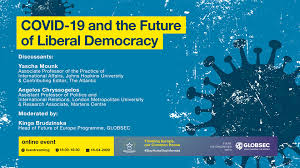 Finally, before the spread of the virus reaches its peak in most countries, there is currently still the possibility of mitigating the impact of the crisis somewhat through significantly increased international cooperation. In recent weeks, the first promising steps have been taken to support developing countries, from temporary debt relief by the IMF and initiatives to strengthen the World Health Organization to aid packages worth billions. However, Federal Development Minister Gerd Müller rightly calls for a clear signal that “Europe is helping” and stresses that, for example, the EUR 15 billion of the EU aid package is merely a reallocation of already budgeted funds and that a substantial increase is needed, including through stabilization loans and emergency aid (Müller 2020).
Finally, before the spread of the virus reaches its peak in most countries, there is currently still the possibility of mitigating the impact of the crisis somewhat through significantly increased international cooperation. In recent weeks, the first promising steps have been taken to support developing countries, from temporary debt relief by the IMF and initiatives to strengthen the World Health Organization to aid packages worth billions. However, Federal Development Minister Gerd Müller rightly calls for a clear signal that “Europe is helping” and stresses that, for example, the EUR 15 billion of the EU aid package is merely a reallocation of already budgeted funds and that a substantial increase is needed, including through stabilization loans and emergency aid (Müller 2020).
In view of the threat of famines of “biblical proportions” (UN News 2020), which the United Nations World Food Programme is fearing in the absence of stabilization and support, it will be essential that the repeatedly emphasized political will for international cooperation quickly results in action. Then this crisis could also be an opportunity for a revival of multilateralism.
Sources: Policy Brief 2020-01
Bertelsmann Stiftung, Hrsg. (2020). Transformation Index BTI 2020: Governance in international comparison. Gütersloh: Verlag Bertelsmann Stiftung.
Bertelsmann Stiftung, Hrsg. (2019). Sustainable Governance Indicators 2019. www.sgi-network.org/2019/Governance/Executive_Capacity (accessed: 26 April 2020).
Booth, Miranda und Jonatan A. Lassa (2020). „Are populist leaders a liability during COVID-19?” https://theconversation.com/are-populist-leaders-a-liability-during-covid-19-135431 (accessed: 26 April 2020).
Deutsche Welle (2020). „Corona-Krise in Südosteuropa: Quarantäne für den Rechtsstaat” [Corona crisis in Southeastern Europe: quarantine for the rule of law], www.dw.com/de/corona-krise-in-s%C3%BCdosteuropa-quarant%C3%A4ne-f%C3%BCr-den-rechtsstaat/a-52896701 (accessed: 26 April 2020).
German Development Institute GDI (2020). “A looming debt crisis in developing countries: What role for the G20?“ https://blogs.die-gdi.de/2019/06/05/a-looming-debt-crisis-in-developing-countries-what-role-for-the-g20 (accessed: 26 April 2020).
Donner, Sabine (2020). “Resistance to democratic regression and authoritarian rule is growing“, Democracy Report BTI 2020. Gütersloh: Bertelsmann Stiftung 2020. www.bti-project.org/content/en/reports/global-report-d/global_findings_democracy_2020_EN.pdf
Hartmann, Hauke (2020). „Global Uncertainty“, Economy Report BTI 2020. Gütersloh: Bertelsmann Stiftung 2020. www.bti-project.org/content/en/reports/global-report-e/global_findings_economy_2020_EN.pdf
International Labour Organization ILO (2018). „ More than 60 per cent of the world’s employed population are in the informal economy”. www.ilo.org/global/about-the-ilo/newsroom/news/WCMS_627189/lang–en/index.htm (accessed: 26 April 2020).
International Monetary Fund (2020). „The IMF’s Response to COVID-19”. www.imf.org/en/About/FAQ/imf-response-to-covid-19#Q5 (accessed: 26 April 2020).
Kleinfeld, Rachel (2020). „Do Authoritarian or Democratic Countries Handle Pandemics Better?” www.carnegieendowment.org/2020/03/31/do-authoritarian-or-democratic-countries-handle-pandemics-better-pub-81404 (accessed: 26 April 2020).
Müller, Gerd (2020). „Das Signal muss sein: Europa hilft – Gerd Müller warnt vor Corona-Ausbreitung.” [The signal must be: Europe helps – Gerd Müller warns against corona spread] Interview, MOZ. www.moz.de/nachrichten/brandenburg/artikel-ansicht/dg/0/1/1797259 (accessed: 26 April 2020).
Palatino, Mong (2020). „What Is Bogging Down the Philippines’ COVID-19 Response?” https://thediplomat.com/2020/04/what-is-bogging-down-the-philippines-covid-19-response (accessed: 26 April 2020).
Pueyo, Tomas (2020). „Coronavirus: The Hammer and the Dance” https://medium.com/@tomaspueyo/coronavirus-the-hammer-and-the-dance-be9337092b56 (accessed: 26 April 2020).
Reuters (2020). „Exclusive: Senior China diplomat concedes challenge of coronavirus, slams ‘overreaction’”. www.reuters.com/article/us-china-politics-exclusive/exclusive-senior-china-diplomat-concedes-challenge-of-coronavirus-slams-overreaction-idUSKBN2082EZ (accessed: 26 April 2020).
Satrio, Abdurrachman (2020). „Indonesia’s Fight against COVID-19: A Battle Over the Meaning of Emergency?“ https://verfassungsblog.de/indonesias-fight-against-covid-19-a-battle-over-the-meaning-of-emergency (accessed: 26 April 2020).
Schwarz, Robert (2020). „Some Reform-Minded Governments Withstand Negative Trend“, Governance Report BTI 2020. Gütersloh: Bertelsmann Stiftung 2020. www.bti-project.org/content/en/reports/global-report-g/global_findings_governance_2020_EN.pdf
Steiner, Achim (2020). „Es ist unvorstellbar“ [It is inconceivable] Interview, Die ZEIT. https://www.zeit.de/politik/ausland/2020-04/achim-steiner-coronavirus-krise-armut-arbeitslosigkeit-schuldenerlass (accessed: 26 April 2020).
Thiery, Peter (2020). „Divisions growing, consensus eroding“, Regional Report Latin America and the Caribbean, BTI 2020, p. 20. Gütersloh: Bertelsmann Stiftung 2020. www.bti-project.org/content/en/reports/regional-reports/regional_report_LAC_2020_EN.pdf
UN News (2020). „As famines of ‘biblical proportion’ loom, Security Council urged to ‘act fast’”, https://news.un.org/en/story/2020/04/1062272 (accessed: 26 April 2020).







